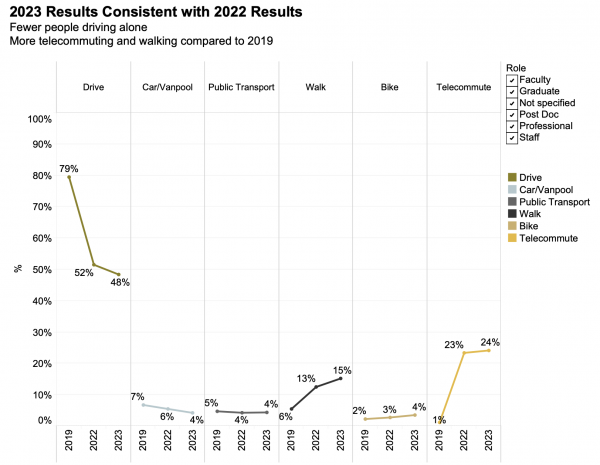What you need to know:
- The annual commute survey is conducted to inform mobility and transportation efforts and to expand Vanderbilt’s understanding and support of its community.
- The 2023 results confirm shifts in post-pandemic commute patterns.
- Dynamic visualizations of the results from 2019, 2022 and 2023 are available on a new website.
Vanderbilt University has released findings of the 2023 survey on commute and transportation practices, conducted to help inform mobility and transportation efforts and expand Vanderbilt’s understanding and support of the community.
The 2023 survey results are consistent with the 2022 results and confirm shifts in commute patterns that will be incorporated into updates to university goals and guide future policies and initiatives. Dynamic visualizations of the commute survey results from the 2019, 2022 and 2023 are available on a new Vanderbilt University Tableau site.
In 2019, a similar commute survey informed goals for MoveVU, a strategic transportation and mobility plan that’s part of FutureVU, Vanderbilt’s comprehensive campus plan. Although paused during the height of the COVID-19 pandemic, a commute survey is now sent every fall to enable Vanderbilt’s Transportation and Mobility Office to closely track the results of MoveVU efforts.
The 2023 survey was distributed to all faculty, staff, graduate/professional students and postdoctoral scholars and had a 42 percent response rate.
Key findings
- Overall, 43 percent of respondents reported they worked entirely on campus, and 51 percent selected “hybrid” as their work status.
- Sustained shifts in mode share between 2022 and 2023 commute survey results are an indication that commute behavior has permanently changed since the COVID-19 pandemic.
- The percentage of commuters driving alone to campus decreased from 79 percent of all commuters in 2019 to 48 percent in 2023.
- 15 percent of commuters say walking is their primary mode of transportation to campus. This is a significant increase from the 2019 survey, when only 6 percent of respondents reported walking as their primary transportation method. This increase was primarily driven by an increase in walking among graduate/professional students and postdocs.
- 24 percent of respondents telecommute as their primary mode of transportation. This is a significant increase from 2019, when only 1 percent telecommuted.
- Staff have the longest commutes compared with other university roles, but on average staff members are on campus fewer days per week.

View the interactive Tableau site to see the commute survey results from 2019, 2022 and 2023.
Next steps
The Transportation and Mobility Office will use the feedback received through the commute survey to shape programs and adjust goals.
The office will continue to administer programs that support and sustain the increase in walking, while working to identify new strategies to spur similar increases in other sustainable transportation modes. While the increase in walking and telecommuting reflects steady progress toward the MoveVU goals, more will need to be done to achieve increased levels of public transit, car/vanpool and biking use.
Graduate and professional students have the largest proportion of people with shorter commutes, making that segment the next logical target for greener commutes. When excluding fully remote learning programs from the analysis, 70 percent of graduate and professional student and postdocs commute less than 5 miles. In particular, when considering programmatic outreach and strategic communications, the 70 percent of graduate, professional students and postdocs who commute less than 5 miles presents a significant opportunity to shift more trips from driving alone to sustainable transportation modes.
As Vanderbilt’s campus continues to transform through FutureVU efforts, understanding mobility challenges and the role of transit services is crucial to achieving sustainability goals and supporting the Vanderbilt community in an equitable and inclusive way. Learn more about MoveVU goals and initiatives at vu.edu/movevu.
About MoveVU
MoveVU is Vanderbilt’s strategic transportation and mobility plan that falls under the FutureVU comprehensive campus planning effort. It is a collaborative partnership between Vanderbilt’s School of Engineering and the Office of Transportation and Mobility in the Division of Administration. The vision of MoveVU calls for a transformation in how the Vanderbilt community commutes to campus, with less reliance on single-occupancy vehicles and parking lots and a greater focus on sustainable commute modes and green spaces.